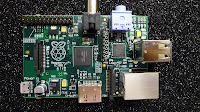 |
Raspberry Pi (Image Credit: wikipedia.org) |
It appears that a minor glitch is the main reason for the delay in the production of the Raspberry Pi computer. According to the Raspberry Pi Foundation, a wrong jack has caused the delay in the production of the $35 no-frills computer.
The jacks that were supposed to be used on the Raspberry Pi were supposed to have integrated magnets into the schematics and CBOM however the jacks that were soldered in at the factory were not magnetic. Using non-magnetic jacks will mean that the Raspberry Pi computer will have no network connections.
The Raspberry Pi Foundation indicated that it already knew about the problem for four days ago but has not revealed it until recently since they were still evaluating the device to find any other issues on the Raspberry Pi computer.
The current models of the Raspberry Pi computer will require minor fixes to deal with the problem since the jack will be de-soldered before the right one is attached. Nearly all the first batch of Raspberry Pi computer units has been fixed at the production plant.
But another problem has emerged since the company will have to look for the appropriate jacks to be used on the Raspberry Pi computers. This will result to additional delays in the future according to reports. With the increasing demand for the Raspberry Pi computer units, it will be a big challenge for the company to release the devices on time.
Pre-orders for the device was impressive as all of the devices were sold out following the acceptance of pre-orders for this credit card-sized device.
The model A of the Raspberry Pi computer will be released within the year. The model that is currently in production is the Model B and is set to be released into the market soon.
Both the Model A and the Model B will feature a 256MB RAM although Model B will have two USB ports compared to the single USB port for the Model A of the Raspberry Pi computer. The two devices will also come with an ARM processor and will need an HDMI or RCA-linked display and a keyboard to provide users with the same user experience as a desktop computer.
No comments:
Post a Comment